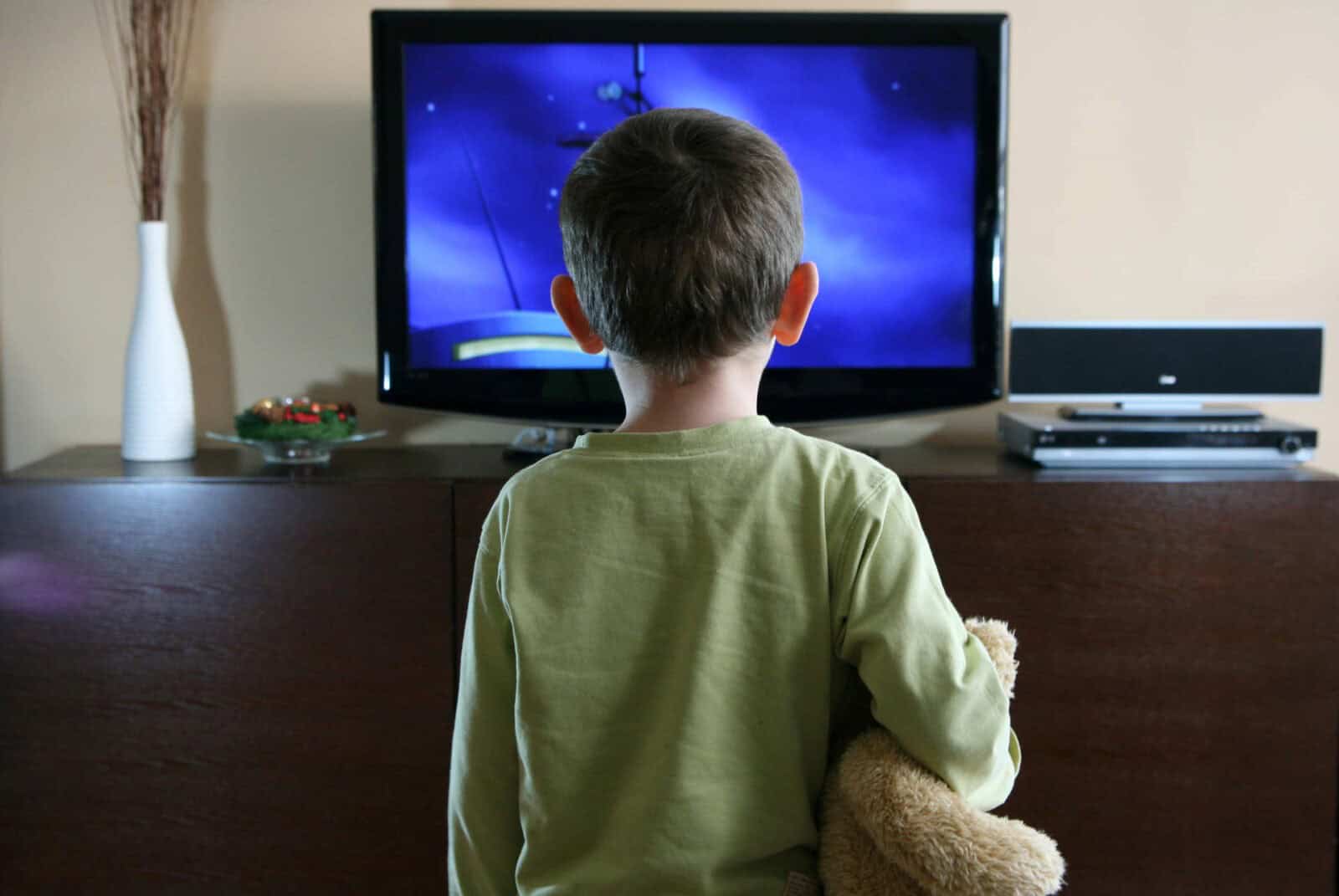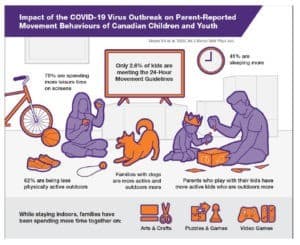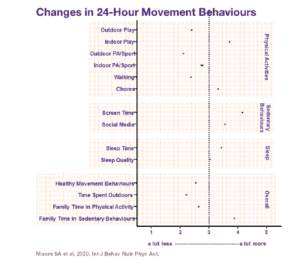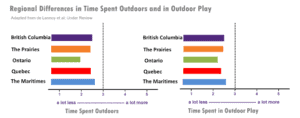
National survey of children and youth shows COVID-19 restrictions linked with adverse behaviours.
Press Release: Summer homework – get kids outside and recalibrate healthy lifestyles
A national survey commissioned by ParticipACTION shows evidence of collateral damage to the lifestyles of Canadian children and youth consequent to public health restrictions imposed to help contain the COVID-19 pandemic. Restricted access to playgrounds, schools, childcare, playdates, and instructions to “stay home” have made it more challenging than ever for kids to develop and maintain healthy movement behaviour habits. In April, one month after the World Health Organization declared COVID-19 a global pandemic, less than 3% of Canadian 5-17-year-olds were meeting the minimum recommendations in the Canadian 24-Hour Movement Guidelines for physical activity, sedentary behaviour, and sleep – in contrast to 15% before the health crisis.
Over 1,500 Canadian parents responded to the survey that assessed COVID-19-related changes in movement and play behaviours. The national study partnered researchers from Outdoor Play Canada, ParticipACTION, and several universities from across Canada. The first of several scholarly papers from the research was published today and shows that grades for physical activity, screen time, and 24-hour movement behaviours would all be “F” during the COVID-19 lockdown. During the restrictions 18% were meeting the physical activity guideline, 11% were meeting the screen time guideline and 71% were meeting the sleep guideline – with only 2.6% meeting the overall guidelines.
“This survey showed that children and youth had lower physical activity levels, less outdoor time, higher leisure screen time and more sleep during the outbreak” said Dr. Mark Tremblay, Chair of Outdoor Play Canada, Chief Scientific Officer for the ParticipACTION Report Card, and Senior Scientist at the CHEO Research Institute in Ottawa. “The rapid deterioration in healthy lifestyle behaviours from already low levels reminds us of the delicate balance required between efforts to prevent disease transmission and those to promote healthy behaviours. Summer homework for many children and families should be to recalibrate healthy lifestyles.”
Dr. Sarah Moore, Assistant Professor at Dalhousie University and lead author of the paper suggests that “survey findings can provide guidance for this summer’s homework”. The study found that parent encouragement and support and family dog ownership were positively associated with healthy movement behaviours. “This pandemic has been extremely difficult for families, but also a time for families to reconnect through play, physical activity, and the outdoors – so take some time together this summer to get outside and be active – it may help to mitigate the negative effects of this crisis for you and your children”, added Moore.


Additional analyses exploring the factors associated with adherence to the healthy lifestyle guidelines provide further insight to help guide movement behaviour recovery from the COVID-19 pandemic. Dr. Michelle Guerrero from the CHEO Research Institute found that high parental perceived capability to restrict children’s and youth’s screen time best predicted adherence to all movement recommendations combined as well as the screen time recommendation, and changes in children’s and youth’s outdoor physical activity/sport since the COVID-19 pandemic best predicted adherence to the physical activity recommendation.
Dr. Louise de Lannoy from the CHEO Research Institute assessed regional differences in policies related to access to the outdoors and outdoor play of children during the COVID-19 outbreak and observed noticeable differences. As illustrated in the figure below (scale 3 = no change), all regions exhibited a decrease in time spent outdoors and in outdoor play (i.e. below 3), with Ontario experiencing the greatest decline in both time spent outdoors and in outdoor play, followed closely by Quebec. Although we have started the recovery process, in the event of a second wave of infections, and in preparing for future public health challenges, policy decision makers should consider ways to preserve outdoor play for Canadian children and youth.

The role of the neighbourhood environment as an enabler or barrier to healthy movement behaviours was also explored. Dr. Raktim Mitra from the School of Urban and Regional Planning at Ryerson University examined changes in different movement behaviours, sedentary activities and sleep during the COVID-19 pandemic. He found while outdoor activities have declined for the majority of children and youth, some children are spending more time walking/biking or playing outdoors than before. A higher proportion of children and youth with increased outdoor activities were meeting the physical activity recommendations and overall 24-hour movement guidelines and for children. Living in an apartment building was a potential deterrent to being outdoors, while low dwelling density possibly encouraged these active behaviours. For youth, access to parks in high-density neighbourhoods increased the odds of increased outdoor activities. These findings will inform future urban planning practices by providing insights into the desirable characteristics of healthy and resilient communities.
Building on the survey results, a current study is underway exploring parental experiences of adapting to COVID-19-related restrictions and the movement behaviours of their children. Led by Dr. Guy Faulkner from the University of British Columbia, this study is comparing and contrasting the experiences of families in Toronto and Vancouver. Findings will inform recommendations to mitigate unintended, collateral consequences of current and future public health restrictions.
Collectively these findings show that restoring and improving healthy physical activity and sedentary behaviours, facilitated by an increase in outdoor time, while adhering to public health guidance to reduce the transmission of COVID-19 is important, necessary, and achievable.
“After a challenging school year, Canadian kids are now facing a summer with limited access to active play in nature and outdoors, which is essential for healthy child development.” says Elio Antunes, President and CEO,ParticipACTION. “However, summer camps or sports leagues aren’t the only opportunities for kids to be active outside. If families are committed to being active together, they will find many simple, affordable and fun opportunities to play, move and enjoy the outdoors while still respecting social distancing requirements.”
Recommendations from the 2020 ParticipACTION Report Card to help families get more active are available at www.ParticipACTION.com. All parents and children are strongly advised to follow the current public health guidelines in their area to limit COVID-19 transmission.
For further information or to schedule an interview please contact:
Dr. Mark Tremblay, Outdoor Play Canada (mtremblay@cheo.on.ca, 613-254-8482)
Dr. Sarah Moore, School of Health and Human Performance, Dalhousie University (sarah.moore@dal.ca)
Dr. Guy Faulkner, School of Kinesiology, University of British Columbia (guy.faulkner@ubc.ca)
Dr. Michelle Guerrero, CHEO Research Institute (mguerrero@cheo.on.ca)
Dr. Louise de Lannoy, CHEO Research Institute (ldelannoy@cheo.on.ca)
Dr. Raktim Mitra, School of Urban and Regional Planning, Ryerson University (raktim.mitra@ryerson.ca)
Elio Antunes, President & CEO of ParticipACTION (info@participACTION.com)

